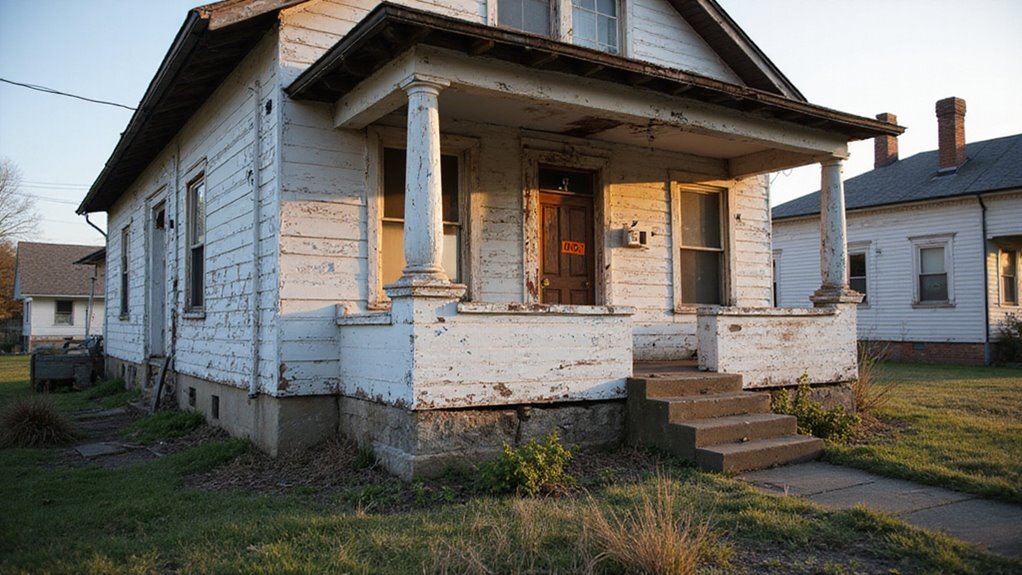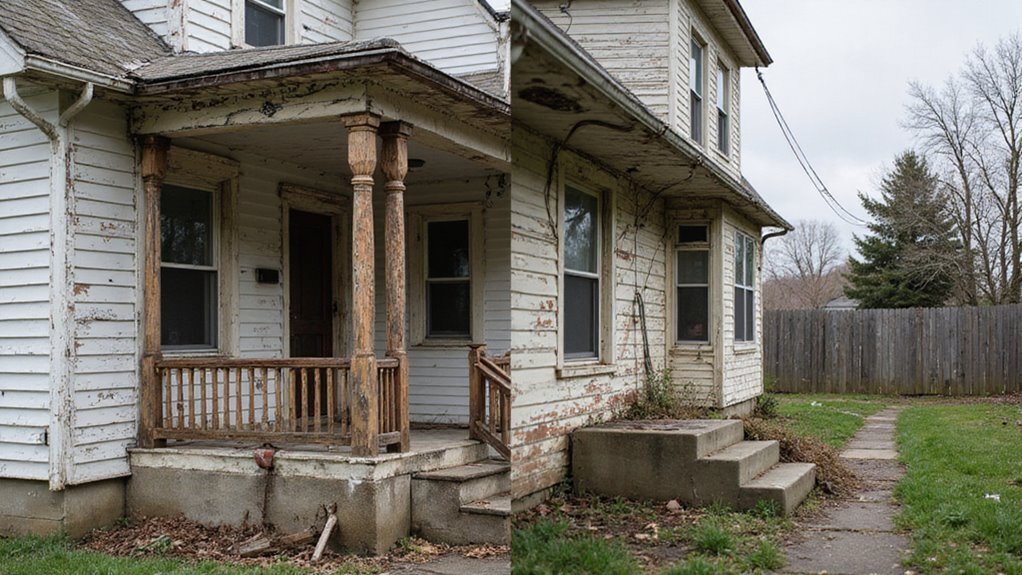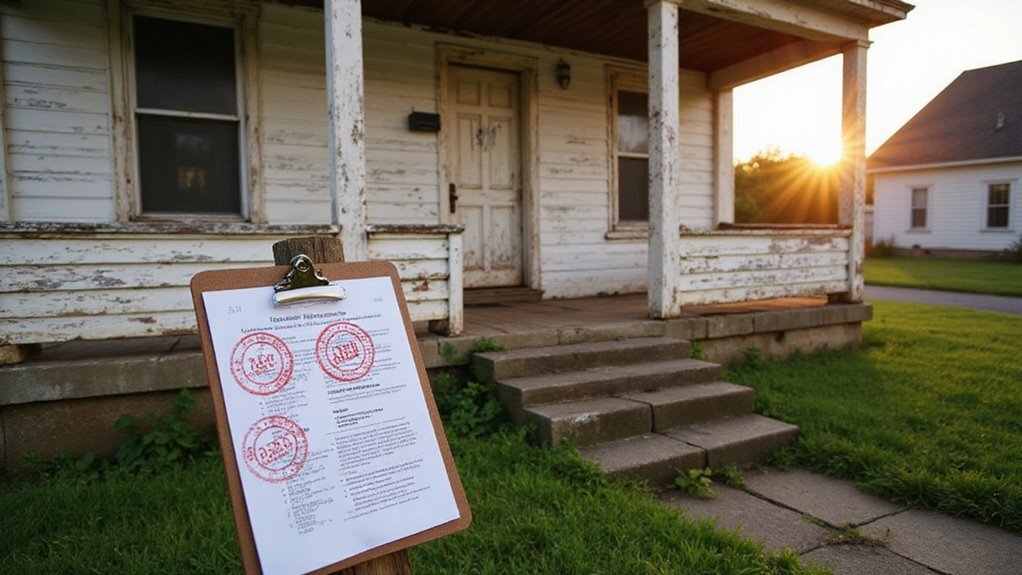Can You Still Sell a House With Code Violations in Kentucky?
Code violations lurking in your Kentucky home could derail your entire selling journey. These violations scare off traditional buyers and create mountains of paperwork. Banks refuse mortgages, and delays stack up while you hemorrhage money on holding costs. Disclosure and strategic pricing make selling code-violation properties possible in Kentucky’s market.
You can sell a house with code violations in Kentucky by disclosing all issues upfront. Price the property accordingly to attract cash buyers or investors. Alternatively, fix critical violations before listing to expand your buyer pool.
In this guide I will explore everything related to selling a house with code violations in Kentucky.
Key Takeaways
- Disclose all known code violations upfront on the Kentucky property disclosure form to ensure transparency.
- Repair major safety and structural violations before listing to prevent legal issues and boost buyer confidence.
- Consider selling to investors or cash buyers who are more flexible with existing violations and quicker to close.
- Conduct a professional home inspection early to identify violations and set realistic pricing strategies.
- Weigh repair costs against potential sale delays or penalties from unresolved violations to determine the best selling approach.
What Are Code Violations in Real Estate?

Code violations in real estate are issues that break local or state building laws. These violations can include faulty electrical wiring, plumbing defects, structural damage, or missing permits. They make properties unsafe or illegal to occupy. Property owners face serious consequences when violations exist.
Local authorities may issue fines or stop sales until repairs are complete. Buyers often discover these problems during inspections. Sellers must fix violations before closing to avoid legal trouble and protect everyone involved.
How Do Code Violations Affect Your Home’s Value?
Code violations directly reduce your home’s value, often by 10-30% depending on severity. Buyers view violations as red flags for safety and habitability problems. They typically submit lower offers or request expensive repairs before closing.
Unresolved violations can delay or completely derail your sale. Most lenders refuse to finance homes with active code violations. Additionally, you must disclose these issues to potential buyers in most states. Addressing violations early protects your investment and builds buyer confidence.

“Brian with Ky Sell Now couldn’t have been any better to deal with. The offer was reasonable, they did what they said they would do, and did it when they said they would do it. Terms were good and they were flexible meeting our terms and needs.“
David Weinberg
What Are Common Types of Code Violations?

You’ll often see violations like structural issues that threaten safety, outdated electrical wiring, or plumbing problems that can cause water damage. Fire safety violations, such as missing smoke alarms or blocked exits, are also common.
Additionally, zoning or permit violations can halt a sale, especially if permits weren’t properly obtained or zoning rules were ignored.
Structural Issues and Safety Hazards
Structural issues and safety hazards can stop your home sale completely. These violations put buyers at risk and trigger inspection failures. Sellers must fix them before closing.
Foundation cracks, roof damage, unstable load-bearing walls, and faulty stairs are the most common problems.
Each one creates legal liability for you. Beyond that, buyers won’t proceed without repairs. Quick action protects everyone involved and keeps your sale on track.
Electrical Code Violations
You must disclose any known electrical code violations when selling your home. Failure to disclose can result in legal consequences after closing.
Common violations include outdated wiring, missing grounding, overloaded circuits, and non-compliant panels. These issues create serious safety hazards for occupants. Additionally, they often require expensive repairs before sale completion.
Fix violations before listing or disclose them honestly upfront. This transparency builds buyer trust and prevents deal complications. Proactive disclosure helps your sale proceed smoothly.
Plumbing and Water-Related Violations
Plumbing and water-related violations include leaks, faulty pipes, old fixtures, and low water pressure. These problems can stop your home sale or lead to expensive repairs. Buyers often walk away when they see major plumbing issues. You should fix these violations before listing your property.
Unpermitted plumbing work violates local building codes and creates legal trouble. A licensed plumber can inspect your system and provide accurate repair estimates. This ensures your home meets all safety standards and helps close the deal faster.
Fire Safety Violations
Fire safety violations include missing smoke detectors, blocked exits, and faulty electrical wiring. These problems create serious risks for anyone in the home. Buyers will notice them during inspections.
You must install smoke detectors in all required areas. Clear all fire exits and remove any obstacles blocking escape routes. Additionally, hire a licensed electrician to fix dangerous wiring issues. These repairs protect lives and make your home marketable.
Zoning and Permit Violations
Zoning and permit violations can legally prevent you from selling your home until resolved. These issues arise when property changes lack proper approval or violate local regulations.
Unauthorized additions, unpermitted structural work, and zoning setback violations are the most frequent problems. Similarly, converting spaces without permits triggers red flags during home inspections.
Building in restricted zones or violating use restrictions creates legal liability for both parties.
Address violations immediately to avoid sale delays. Disclose all known issues upfront to maintain buyer trust and demonstrate good faith.
Should You Fix Code Violations Before Selling?
Yes, you should fix code violations before selling if they involve safety hazards or structural issues. Buyers and lenders often require repairs for serious problems. This approach protects you from legal trouble later.
However, minor violations may not need immediate fixes. You can disclose them and adjust your price instead.
Local code enforcement may impose penalties if violations remain unresolved. Weigh repair costs against your timeline and buyer expectations to make the best choice.

“Brian was so easy to work with. They were quick and efficient. After several months of working with another buyer without closing the deal, we are thankful to have found him. We were able to get a deal done and finalized in just a matter of weeks! I would recommend Kentucky Sell Now to anyone.”
What Are Your Options When Selling With Violations?

You have several options when selling a house with violations. You can sell as-is to traditional buyers, negotiate repair credits, or target investors and cash buyers willing to take on the issues.
Sometimes, focusing only on major safety concerns makes the process quicker and easier.
Selling As-Is to Traditional Buyers
Yes, you can sell your home as-is to traditional buyers even with code violations. You must disclose all violations upfront by law. Price the property lower to reflect needed repairs. Traditional buyers will likely negotiate or request inspection credits.
Focus on attracting investors or contractors who handle renovations. These buyers see potential despite violations. Provide complete inspection reports to build trust. Clear communication about issues prevents deal failures later.
Accept that your buyer pool will be smaller. However, honest listings still attract serious offers when priced fairly.
Negotiating Repair Credits
Repair credits let you close a home sale without fixing code violations yourself. The buyer receives money at closing to handle repairs later.
This strategy speeds up the transaction. Buyers typically get a credit equal to the estimated repair cost, plus 10-20% for contingencies.
You avoid repair delays and contractor coordination. Meanwhile, buyers control how fixes get done.
Provide written estimates from licensed contractors to support your credit offer. Transparency builds trust and prevents disputes at closing.
Working With Investors and Cash Buyers
Yes, investors and cash buyers often purchase properties with code violations. They view these issues as opportunities to add value through repairs and improvements.
These buyers typically pay cash and close quickly. You should disclose all violations upfront and price your home to reflect needed repairs. Transparency builds trust and speeds up the process.
Cash buyers expect lower prices in exchange for accepting properties as-is. They handle repairs after purchase, which removes your burden.
This arrangement benefits sellers who need fast, simple transactions without making costly fixes first.
Addressing Only Major Safety Concerns
Yes, you can focus on major safety violations first. This strategy helps you sell faster while managing repair costs effectively.
Address critical issues like faulty wiring, fire hazards, or structural damage that create legal liability. Buyers often accept minor violations when serious safety problems are fixed. This shows good faith and protects you from future lawsuits.
The approach makes your property more marketable. It also prevents expensive post-sale disputes while keeping repair budgets reasonable.
How to Disclose Code Violations to Potential Buyers?
You must disclose known code violations clearly and honestly to potential buyers to stay compliant with Kentucky law.
Prepare a detailed disclosure document that covers all issues, including safety and permit violations, and provide it early in the sales process.
Doing this before negotiations or inspections helps avoid legal trouble and keeps the sale moving efficiently.
Legal Requirements for Disclosure
Yes, Kentucky law requires sellers to disclose known code violations on the mandatory property disclosure form. Withholding this information can result in legal penalties or contract cancellation.
Document all known violations in writing before listing your property. Update the disclosure immediately if you discover new issues. This protects you from future liability claims.
Work with a real estate attorney to ensure compliance. Honest disclosure builds buyer confidence and prevents costly disputes after closing.
Creating a Comprehensive Disclosure Document
A comprehensive disclosure document lists all known code violations with specific details about each problem. You must describe electrical issues, plumbing defects, and missing permits accurately. This transparency protects you from future legal claims.
Kentucky law mandates complete disclosure before closing. Honest reporting builds buyer confidence and prevents disputes later. Include whether repairs are required and any potential fines. Clear documentation of violations ensures smooth transactions while meeting your legal obligations.
Timing of Disclosures in the Sales Process
Disclose code violations before you accept an offer or during the initial listing stage. Early disclosure protects you legally and builds buyer confidence.
Kentucky law requires sellers to reveal known defects that affect property value or safety.
List all known violations in your property disclosure form. Buyers deserve complete information before they make financial decisions.
Update your disclosures immediately if inspections reveal new code issues. This transparency prevents legal disputes and keeps your sale on track.
How to Sell Your House With Code Violations Fast?
To sell your house with code violations quickly, start with a professional home inspection to identify issues upfront.
Price your home realistically to attract cash buyers or investors who are willing to overlook violations.
Work with an experienced agent who knows effective marketing strategies and local laws to move the sale fast.
Getting a Professional Home Inspection
A professional home inspection reveals all code violations before you list your property.
This assessment typically costs $300 to $500 and takes 2-4 hours to complete. You’ll receive a detailed report highlighting safety issues and needed repairs.
Choose an inspector certified by ASHI or InterNACHI for the most reliable results.
The report helps you prioritize which violations to fix first. Buyers appreciate transparency, which speeds up negotiations and prevents last-minute deal failures.
Pricing Your Home Appropriately
Price your home 5-30% below market value when code violations exist. The discount depends on repair costs and violation severity.
Electrical issues warrant 10-20% price reductions. Plumbing problems require 15-25% discounts. Structural violations may need up to 30% off. Meanwhile, permit issues typically mean 5-15% lower prices.
Fair pricing attracts serious buyers quickly. They appreciate transparency about necessary repairs. This approach builds trust and prevents deals from falling through later.
Marketing Strategies for Homes With Violations
How do you market a home with code violations? Target cash buyers and real estate investors who can handle repairs. These buyers expect discounts and won’t back out over violation issues.
Price the home competitively to reflect its current condition and required fixes. Be upfront about all known violations in your listing. Transparency builds trust and prevents deals from falling apart during inspection.
Highlight the property’s location, size, and potential value after repairs. Strong bones matter more than surface problems to experienced buyers.
Finding the Right Real Estate Agent
An experienced real estate agent helps you sell faster and avoid legal problems. They know how to work with properties that have violations.
Your agent should understand Kentucky property laws and have connections to real estate attorneys. These professionals handle required disclosures and protect you from liability.
The right agent markets your home to investors who buy problem properties. They price it correctly and negotiate deals that work for you.
Most importantly, they guide you through each step while keeping everything legal and compliant.
Ready to Sell Your House With Code Violations? Contact Kentucky Sell Now Today!
Kentucky Sell Now buys houses with code violations for cash.** We purchase properties in any condition, including those with unresolved violations.
Code violations don’t disqualify your home from a fast sale. Our team evaluates your property and makes a fair cash offer within days. We handle the inspection process and legal compliance requirements. As a result, you avoid penalties and lengthy repairs.
The sale happens on your timeline. We buy homes as-is, which means no fixes or upgrades needed. Contact us today for a no-obligation offer that addresses your specific situation.
Can I sell my house in Kentucky if it has code violations?
Yes, you can sell it, but you must disclose the violations to buyers or sell “as-is” to cash buyers.
Do I need to fix all code violations before selling?
Not necessarily. You can sell to investors or cash home buyers who purchase homes in any condition.
How do code violations affect my home’s selling price?
They often reduce your home’s market value since buyers factor in repair and compliance costs.
What types of code violations are most common in Kentucky homes?
Common issues include electrical hazards, plumbing leaks, structural damage, and outdated building permits.
Who buys houses with code violations in Kentucky?
Cash home buyers and real estate investors frequently purchase such properties without requiring repairs or inspections.
Sell Your House Fast in Louisville 💰
We buy houses in Louisville As-Is! No Hidden Fees or Real Estate Commissions. Sell Your House in Louisville And Close On The Date Of Your Choice. Simply Fill Out The Form, or call (502) 610-0070 today!

